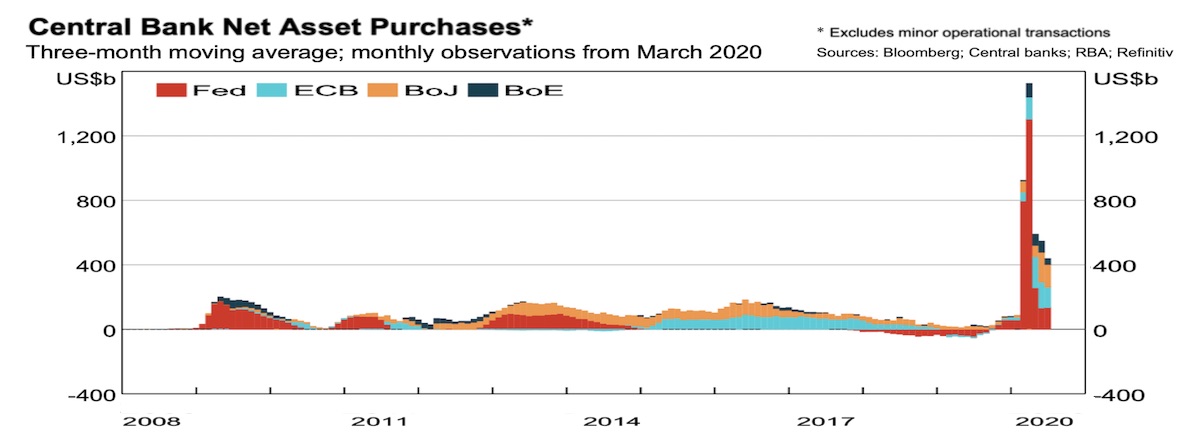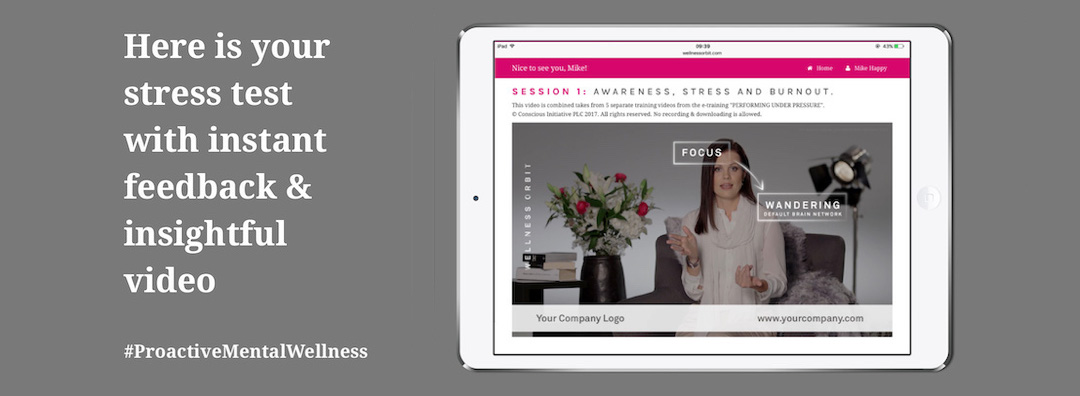Efficient stress relief starts from training your mind(s)
Stress Awareness Day, every year on the first Wednesday in November, aims to point out the importance of stress relief and offer solutions on how to reduce the stress levels in your life and work situations efficiently. Stress Awareness Day was established by the International Stress Management Association (ISMA) to provide information on stress and strategies on how to address it for both workplaces and individuals.
Only when every workplace, and all individuals in it, look after their mental fitness and well-being proactively before stress leads to any critical health problems can business gains be achieved (see our blog post about the positive ROI of proactive mental health at work earlier this year).
REMOVE STRESS, BURNOUT AND MENTAL HEALTH PROBLEMS
This Nordic origin Mental Wellness Gym is designed and built to assist employers and employees who want to remove stress, burnout, and mental health problems. While most mental health approaches are reactive in their essence, this approach here is proactive as it actively enables to nip mental health issues in the bud.
Wellness Orbit is a fully digital solution that focuses on the prevention of work-related mental health problems and brings forward the most effective proactive mental wellness approach in general. For that, we provide many free resources such as articles, blog posts and e-books, short free videos, and a free e-training that comes with a stress test, as well as high-value and highly efficient digital workplace-wide e-trainings that support employee productivity without sacrificing mental health in the process.
|
While all mental health campaigns are great, such as the World Mental Health Day (on October 10) or ISMA initiated Stress Awareness Day, those campaigns only deliver results when you take real action.
Have you started looking after yourself and the way you and your colleagues work and live?
WHAT IS THE BEST ACTION TO TAKE?
For sustainable results, you need to become aware of what causes stress. Breaking down the individual stressors in your life or the workplace or your home office isn't enough. Efficient stress relief isn't about removing stressors.
As the amount of external stressors (including stressors at work) is endless, focusing on avoiding stressful situations leads to avoiding life and success.
The approach that focuses on avoiding stressors and stressful situations is, by its nature, reactive. More importantly, it has been used for decades, and it has delivered relatively poor results.
Mental health related statistics showing stress and burnout figures of employees and entrepreneurs, and general population statistics about depression, anxiety, bipolar disorder, eating disorders, and even substance use disorders are still getting worse year after year.
Unfortunately, the pandemic has influenced most of those numbers to become even worse. Many professionals believe that even seasonal affective disorder (SAD) may hit people harder this year than ever before, as people often lack normal routines due to the lockdown.
FINANCIAL SITUATION AS A STRESSOR
Besides classified mental health problems, there are also financial worries and financial stress. Lockdowns are leading us towards the greatest economic depression, due to the enormous amount of currency printing by the FED (Federal Reserve Bank), BoE (Bank of England), the BoJ (Bank of Japan), and the ECB (European Central Bank), as the next graph illustrates. The situation is now much worse than we faced during the economic downturn back in 2008.

Once the global financial crisis hits its low, mental health problems will become even worse as the number of stressors will grow exponentially whilst money for treatment starts to vanish due to hyperinflation that is bound to come. That is why prevention and proactivity are needed now; it allows both entrepreneurs/employers and employees to be prepared to deal with the enormous economic pressure that is coming.
Why are mental health issues so common, and what is the major pathway to mental health problems?
STRESS – A MAJOR PATHWAY TO HEALTH PROBLEMS
Stress is the major pathway to all health problems, not only to issues related narrowly to mental health at work.
It is a scientifically proven fact that failure to deal with stress effectively can lead to serious mental illnesses and physical health problems, including increased blood pressure, susceptibility to heart disease, etc. It can also cause a decline in your immune system, which will leave you more vulnerable even to being infected with COVID-19, which has been causing national lockdowns, international travel bans, and forcing us to work from our homes.
Working from home is a good example of how removing stressors in the workplace doesn't solve the stress problem. Now, when you work from home, you have different stressors, like Zoom meetings or Skype calls, kids popping into the room where you work, needing to cook your own food while working, often reduced income, etc.
While many stressors in the workplace have been eliminated by staying at home, stress levels haven't dropped as new stressors have popped up. As a result, stress and anxiety levels are higher than ever before. That shows well that stressors come and go, and the real problem is elsewhere.
WHAT DOES STRESS CAUSE FOR EMPLOYERS?
Once people start experiencing the symptoms of chronic stress, these problems can cascade into each other, resulting in employee burnout, a growing number of sick leaves, absenteeism, and presenteeism. As the brightest minds burn out, others need to take over and are now left more vulnerable to stress and burnout.
Failure to provide stress relief in time is truly a self-feeding problem. A cycle that gets started with a losing focus on tasks at hand grows soon into chronic stress and then develops slowly from stress to burnout. The result is poor productivity and lack of employee engagement (Note that presenteeism is the contributing factor to both of those problems).
Today, our team is sure that it isn't a coincidence that, according to the Gallup studies, approximately 70-80% of employees lack work engagement, while according to mental health studies, about 70-87% of employees are stressed. There is a clear overlap. Most employers haven't compared those two statistical numbers and understood the cascade of problems that stress delivers.
INTRAPERSONAL SKILLS REMOVE YOUR STRESS PROBLEM
The solution isn't out there or in removing every potential stressor from your life. If external work stressors are to blame for experiencing stress, you shouldn't experience any stress at home, as stressors present in the workplace aren't there in your home.
Studies show that stress is now an even bigger problem than before the pandemic, as working from home still causes a lot of inner reactivity that keeps us stressed.
Let's observe two additional challenges. When people work from home, they also walk less outside and often have a less healthy diet (but it seems easier to talk about Zoom stress than to take a long walk in nature). This often can lead to sleep deprivation or eating disorders.
LESS SLEEP CAN LEAD TO MORE STRESS
Less sleep is a pathway to more stress as it can lead to more cortisol production, which can worsen stress even more and further contribute to insomnia/excessive wakefulness. Being more awake during lockdown means having more snacks, and that, combined with less possibility to go outside, can cause obesity. So, stress is indeed a self-feeding problem. Until you lack intrapersonal skills on how to remove your own inner reactivity, you keep piling up suffering.
The most efficient solution for stress reduction and even stress prevention is to remove your inner reactivity. When you become aware of what happens within your mind, you can replace your automatic reactivity with an aware and adequate response.
For noticing and leading the different processes within your mind with awareness, you need efficient intrapersonal skills.
Only practical intrapersonal skills can make a difference in how people experience their workloads and work conditions. Practical skills that secure a healthy mind also give you the ability to focus on your professional tasks. Be it at home or in the office, or in any other workplace. So, dealing with stress is a win-win game that brings both (mental) health gains and huge productivity wins.
Everyone can experience stress, but only a few can deal with it successfully. Many studies point out that more than 70% of employees experience stress daily. What we also know well is that stress levels are high across all age groups (see the graph based on the data collected by Investors in People back in 2018).

POSITIVE STRESS OR EUSTRESS IS MISUNDERSTOOD
While there is a myth that positive stress can be good for us, it isn't so. The fact is that positive stress or eustress is the leading cause of employee burnout, and burnout again is the leading cause of depression. Positive stress is often combined with anxiousness that can easily lead to anxiety when experienced daily.
While distress or negative stress is relatively easy to notice, many leaders and highly skilled professionals, and business leaders experience “sudden” burnout because of unnoticed positive stress.
BURNOUT DEVELOPS SLOWLY AND OFTEN STARTS FROM POSITIVE STRESS
The reality is, there is nothing sudden about burnout. Stress builds up slowly, which is why we often fail to notice how it leads us towards burnout, especially dangerous is in this case the eustress or positive stress that tends to boost our activity and initially brings along some success.
As positive stress may initially lead to better work results, it is often misinterpreted. And that has led people to a false belief that some eustress is good and needed.
However, if we compare a person with good, excellent awareness-based intrapersonal skills with a person who rides on the tides of positive stress, then we can see that a self-aware person doesn't burn out, while a stressed person often does. That is why an aware response is better than super-fast reactivity and false positivity that comes along with positive stress.
Compared to passiveness positive stress may indeed seem good, but compared to a person who is aware of his/her awareness it is a very inefficient way that leads to an inevitable crash that comes in the format of burnout, depression, anxiety, or even more serious mental illnesses that demand long treatment periods and leave people unproductive and ill.
PSYCHOLOGICAL SAFETY 2.0
While identifying the stressors impacting our physical and mental health in workplaces is an important component of psychological safety at work, the prevention of mental health problems truly becomes efficient and achieves an excellent ROI by bringing in a workplace-wide proactive mental wellness approach.
When the proactive approach reaches every single employee (even when they work from home), more sustainable work patterns and sustainable paths to individual well-being can appear. When it appears, it supports both productivity and employee engagement.
The proactive mental wellness approach is the best psychological safety as well as work(place) safety measure that is currently available for employers and employees alike. The mental fitness and mental toughness that come out of such an approach enable one to avoid health problems and reduce accidents (as intrapersonal skills enable one to keep focus longer and even among external disturbances).
CONCLUSION
Once you become aware of your inner stress reaction and choose to replace it with an aware response, you can truly reduce your stress level.
Experiencing personal stress relief enables everyone to secure an excellent quality of life (including good personal health) and achieve efficient ways to work (even under external pressure).
This blog post is written by Kaur Lass. Last update 30.12.2024



